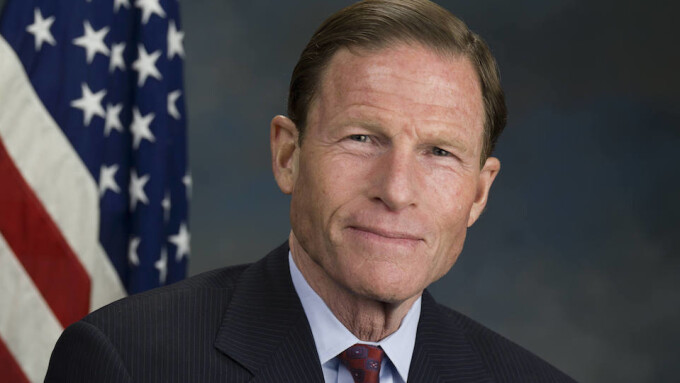WASHINGTON — Adult industry, sex worker and digital rights advocates unanimously sounded the alarm today about the nefarious implications for state censorship and privacy issues of the revived EARN IT Act, which was re-introduced yesterday by Senator Richard Blumenthal (D-Connecticut).
The bill, which purportedly aims to “protect victims and survivors of child sexual exploitation,” and which was announced by Blumenthal with a media blitz about “child protections,” is in fact a broad overhaul of Section 230 protections — known by online rights advocates as the First Amendment of the internet — that would strip platforms of immunity for third-party uploaded content.
As XBIZ has reported, EARN IT will also open the way for politicians to define the legal categories of “pornography” and “pornographic website” as they — or the lobbies that fund them — please, which is a cherished goal of organizations that seek to reintroduce obscenity prosecutions for content now protected by Free Speech jurisprudence.
EARN IT has been championed by top religiously-motivated anti-porn crusading groups such as NCOSE — formerly Morality in Media — which reportedly received advance notice of its reintroduction yesterday.
“If you want to know just how bad the bill is,” tech news site TechDirt’s legal reporter Mike Masnick wrote today, “I found out about the re-introduction of the bill — before it was announced anywhere — via a press release sent to me by NCOSE,” which he described as “the busybody organization of prudes who believe that all pornography should be banned.”
NCOSE, Masnick added, ”was also a driving force behind FOSTA, the dangerous law with many similarities to EARN IT that, as we predicted, did nothing to stop sex trafficking, and plenty of things to increase the problem of sex trafficking, while putting women in danger and making it more difficult for the police to actually stop trafficking.”
EARN IT Returns From Its Early Grave
The bill was initially introduced in 2020 by Blumenthal in partnership with his South Carolina Republican colleague Lindsey Graham.
At the time, Graham made explicit his relentless aim to censor adult content online, writing to a constituent in an email, “I have concerns about our children’s ability to access pornographic material through the internet and email. While I wholeheartedly support the First Amendment, I do not believe exposing young people to pornography is an acceptable exercise of freedom of speech.”
In Dec. 2020, he vowed to continue pushing in Congress "to limit society’s exposure to inappropriate material."
When the bipartisan effort was first unveiled during the last presidential campaign, both senators loudly ballyhooed it as a forceful anti-Big Tech measure. However, critics pointed out that besides its already controversial intended mission to erode or even repeal Section 230 protections, the bill would also crucially undermine privacy by targeting encryption.
As TechDirt’s Mike Masnick pointed out, corporate and intelligence complaints against the encryption-busting potential of EARN IT were so concerning that Blumenthal and Graham were eventually “persuaded to adopt an amendment from Senator Patrick Leahy to more explicitly attempt to exempt encryption from the bill, but it was done in a pretty weak manner.”
Then, in late 2020, Graham and a lame-duck President Trump attempted to force Congress to pass EARN IT by bundling it with an unrelated bill, but that effort was thwarted at the last minute and the bill died for that congressional period.
Yesterday, though, Blumenthal loudly announced that EARN IT is back on the table. The bill is virtually unchanged from its previous incarnation, which was opposed by most digital rights and privacy groups, and also by adult industry organizations and sex worker advocates.
FSC's Stabile: 'Potential to Devastate' Sex Workers and Creators
The reemergence of the bill generated enough concern to prompt Mike Stabile, Free Speech Coalition's director of public affairs, to tweet an urgent call to arms against what he calls “SESTA-FOSTA 2.0,” warning that “it’s back and the danger it poses to sex workers is more extreme than ever.”
Stabile urged members of the adult industry and sex workers to “get up to speed quick” on the potential impact EARN IT could have on their livelihoods. “It's got bipartisan support, a moral panic at their back and the potential to devastate the hard-fought gains of the sex work creator economy.”
Kate D’Adamo, a noted advocate for the rights of sex workers with nonprofit Reframe Health and Justice, likewise expressed urgency by pointing out that EARN IT is “already scheduled to get marked up, which is the first step post-introduction. Most bills never go to markup, so this means they are putting pressure to move this through.”
XBIZ spoke today with Stabile, who added that “the bill will lead to the type of wide-scale deplatforming of sex work and sexual speech that we saw after SESTA-FOSTA.”
“Were it to pass,” he emphasized, “we'd likely see most, if not all, adult content and accounts removed from mainstream platforms, for fear of the liability that could come with ever accidentally hosting CSAM, as well as the erasure of end-to-end encryption on messaging platforms.”
Blumenthal’s revived EARN IT Act, Stabile noted, “uses a moral panic to enact more surveillance, more discrimination and more censorship of sex workers.”
The 'But the Children' Excuse
Industry attorney and First Amendment expert Lawrence Walters, from the Walters Law Group, concurred that “this ill-conceived legislation threatens to decimate online freedom and eliminate the ability to communicate privately, without government surveillance.”
“Like other internet censorship legislation,” Walters continued, “this rebooted EARN IT act is being sold as a ‘child protection’ bill, in order to pressure lawmakers to vote for it without critical evaluation. In reality, the bill will intensify the harms caused by [SESTA/FOSTA], disproportionately impact LGBTQ individuals and target sexual education materials.”
Walters said that he nevertheless remains “hopeful that Congress will again reject the EARN IT Act as a danger to expressive freedom and an infringement on the right to privacy.”
Main Image: Senator Richard Blumenthal (D-Connecticut)






